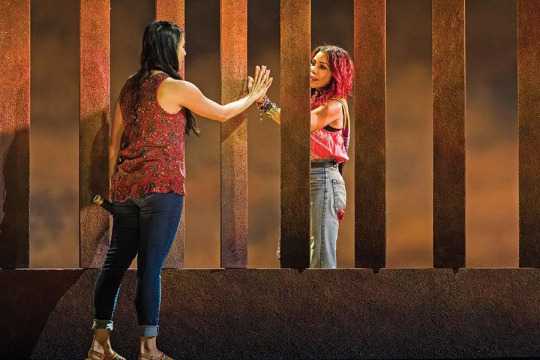Don't wanna be here? Send us removal request.
Text
The Courtroom Scenes in Miss You Like Hell and Zoot Suit
Sorry but not sorry to all my regular followers but I have thought way too much about these two plays lately so you’re getting a highly specific rant.

Credit: Universal/Courtesy Everett
In both shows, a “knowledgeable” character (El Pachuco and Beatriz’s lawyer) tell the “main character” (Henry and Olivia) there is little chance of them winning the case, and both cases end poorly (for the moment). Henry’s case ends dismally after a lot of racism and humiliation from the judge and prosecution (being made to stand repeatedly, not allowed to get clean clothes or a haircut), but with the hope of a future appeal should he choose it.

Credit: Zoot Suit (1981)
Henry and Olivia are very different characters, but they share an internal struggle: should they fight in court or not? Their reasons to not fight are very different, Henry is influenced by the defeatist voice of El Pachuco “Once a Mexican goes in [to prison], he never comes out.” (1353) and Olivia, who isn’t fighting for her own freedom but her mother��s, isn’t sure if Beatriz deserves her help. When Olivia first finds out Beatriz needs her to testify, she is upset that her mother would come get her seemingly out of concern then ask something so large of her (paraphrased from 34).
While Henry is fighting for his own freedom, someone he loves is also punished during the trial. Della is ordered to stay at the state school for girls, and the judge doesn’t even give a reason for this! (1352) This is also the moment when Henry loses some hope, because his lawyer informs him that they aren’t going to win the initial case, but an appeal. In Olivia’s case, she knows losing her mother is an option the entire time, even a likelihood. Her choice to testify, to fight in court, suggests that she has some hope of winning, though we don’t know how likely she thinks it is.

Credit: Jim Carmody/American Theater
The greatest difference between the scenes is probably the way they are placed in the story
Miss You Like Hell’s courtroom scene is the climax of the play, a deciding moment we have been building up to throughout the story. Olivia’s titular song is a partially true ode to her mother, and her actions are an expression of love, shes fighting for her mother in the way her mother didn’t fight for her in her parents separation. Their loss at the hearing is final, but not without hope as they meet again at the park and see each other, both literally and metaphorically. Zoot Suit’s court scenes are in the middle of the play. They are extended and contain more blatant injustice and racism, but the verdict is only a beat in the greater story, as there is still half a play left for the true fate of the 38th street gang to be revealed. In short, each scene embodies a different kind of hope.
Valdez, L. (1978). Zoot suit: A New American play by Luis Valdez. Center Theatre Group of Los Angeles
Hudes Quiara Alegría, & McKeown, E. (2019). Miss you like hell. Theatre Communications Group.
1 note
·
View note